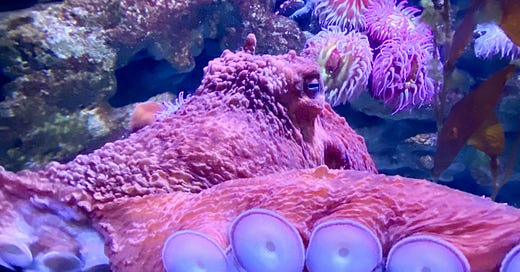Inaugural Dad,
While you were in Washington, D.C. this weekend, I was at the aquarium in Tampa, FL. One of these places is an artificially curated environment filled at public expense with buckets of oceanic sludge so that parasitic barnacles and a variety of other gelatinous organisms can maintain their brainless, spineless existence. The other is an aquarium.
The one in Tampa is fine—I’d rate it 3.5 stars. But the fish—the fish I loved. From me, fish get five stars. So do stingrays, octopuses, waterfowl, and yes, even otters. I’m not sure where exactly to leave my review, but I’d like to give God two big thumbs up when it comes to fish.
Except he didn’t ask my opinion, not even once. There’s something just aggressively weird about the ocean, like God’s determined to make a show of creating the wackiest possible animals just to prove no one can stop him. Why’d he want those little jelly blobs around? What about those little fluttery ones that look like leaves?
Considered as a work of art, the universe expresses a raucous and insatiable appetite for life in every possible variety. The skill is that of a Rembrandt but the spirit is that of a toddler with a box of crayons. I don’t think we take this into account nearly enough in our theology, what a limitlessly free and ravenously inventive mind we must be talking about when we talk about God. Why make a global swimming pool and fill it with space aliens? His answer seems to be something like uh, why not??
All this to say I see now why you were talking about that bird. It reminds me of the passage in C. S. Lewis’s novel Perelandra, where our hero makes it to the inside of a distant planet and discovers a yawning architecture of regal chambers underground: “Assuredly the inside of this world was not for man. But it was for something.” As Chesterton pointed out, this fantasy only rekindles the strangeness of the world we’re already living in, which is endlessly full of eerie caverns and misty dwelling places for more than human souls.
“The Lord God of Israel,” wrote one of Lewis’s favorite writers, Thomas Traherne, “was from all Eternity, and from all Eternity wanted like a God…. He wanted Worlds, He wanted Spectators, He wanted Joys, He wanted Treasures.” As he explained to Job, he wanted a world filled with ostriches and bulls and mountain goats, and he was entitled to make them as wild as he pleased without explaining himself.
We now know he also wanted quasars, and nebular dust, and giant squids. Whether he made space to house these things, or whether it’s only the necessary mental condition under which they appear to us (which you’ll recall is my preferred answer, and Kant’s) seems less important than this fact: when we talk about miracles, we’re not talking about any reality other than the one in which, wonder of wonders, we already live and move.
Glub,
Spencer
Image: Betty Wills (Atsme), CC BY-SA 4.0, via Wikimedia Commons






Spencer, I love how you and your dad so eloquently bring to life the liturgy of "Everything is God and all things are in God." There is no end to the gazillion wondrous details we humans witness in our ordinary lives. Please keep sharing your wondrous details with us.
It’s all akin to what my then-young son once said: “Platypuses are evidence that God has a sense of humor.”